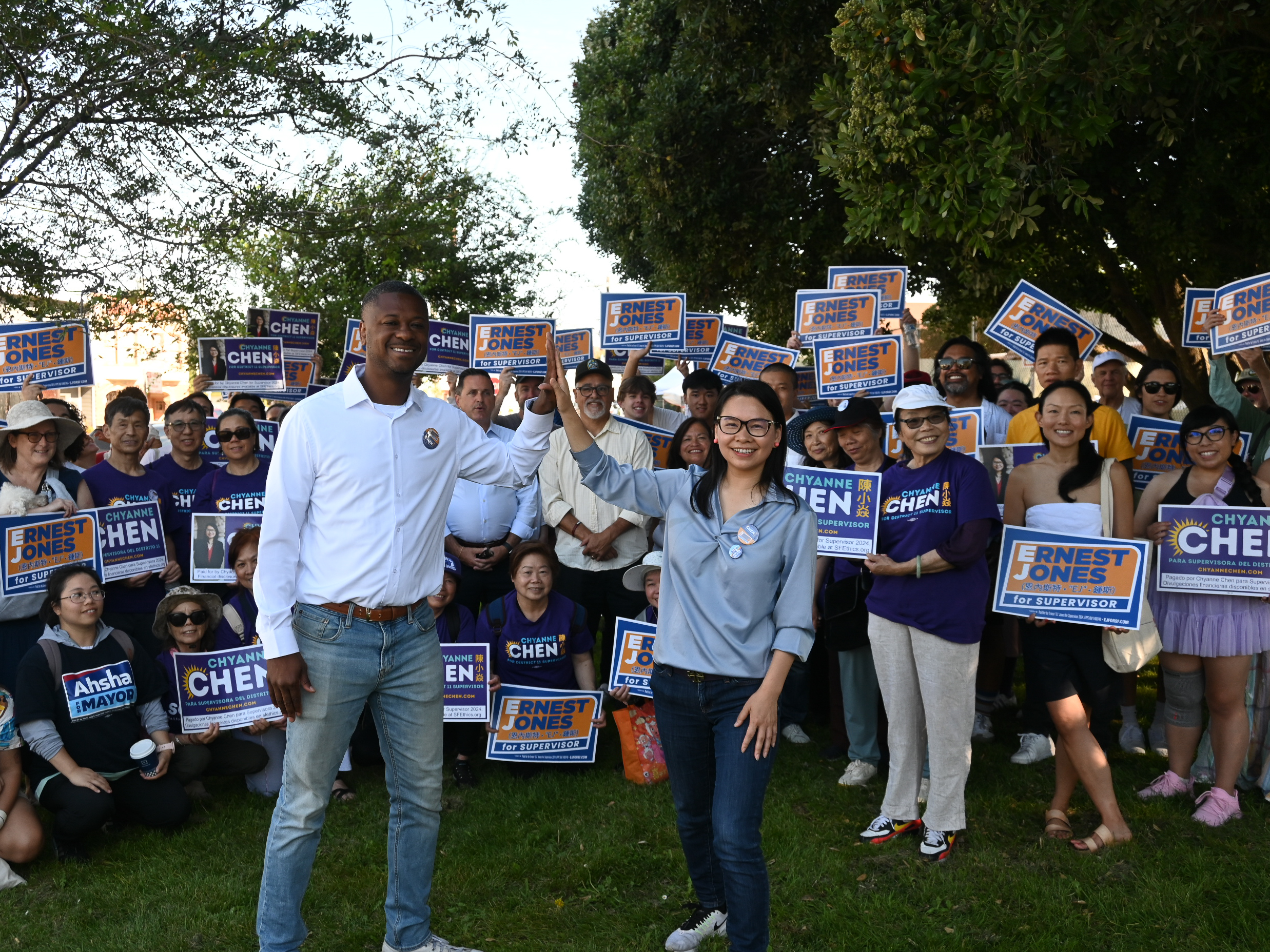[ad_1]
Longtime labor organizer candidate Chyanne Chen has won the tight District 11 race on Sunday, with a slim 190-vote lead over moderate candidate Michael Lai.
Chen will succeed termed-out incumbent Ahsha Safaí.
“I’m proud and honored to be Supervisor-elect for District 11,” Chen wrote in a statement. “This was a close election, and I am committed to bringing people together to fight for stronger communities, safe neighborhoods and improved services.”
“We couldn’t do it alone,” Chen told Mission Local. Chen was bolstered by some $700,000 in outside spending by labor unions and an Asian-American political group, dwarfing the money behind Lai. “This is definitely a victory that belongs to the community. It belongs to everybody.”
By 2 p.m. Sunday, Lai conceded on social media, saying he called Chen “to offer her congratulations as the first Asian supervisor for District 11 and offer my help to make our district the best it can be.”
“To the working families, small business owners, young & old — I’m not going anywhere,” Lai said. “We’re just getting started.”
A tight race in District 11, a flip on Nov. 9
The race down the stretch between two Asian immigrants in a District that is 58 percent Asian, was the tightest race among the six contested odd-numbered districts.
Lai led on election night with 5,014 first-choice votes, with Chen trailing by 392 votes. Lai remained in the lead until Nov. 9, when Chen caught up and surpassed Lai by 99 votes after the ranked-choice voting tabulation.
“Later votes are usually more progressive,” Chen said on Nov. 12. “It was shown on Saturday. I hope that it will continue to be coming my way.”
From Nov. 9, Chen held a narrow lead, but Ernest “EJ” Jones’ second-choice votes continued to fuel it — 43 percent of his supporters chose Chen and just 24 percent chose Lai.
Jones, who came in third in first-choice votes, was a former aide to the incumbent Safaí and in the last month leading up to the election, Jones campaigned side-by-side with Chen — door-knocking and having events such as meet-and-greets together.

Of his votes, 2,833 transferred to Chen, while only 1,566 — about a half of what Chen got — went to Lai, according to the latest results from Nov. 17.
Jones was not surprised by the amount of votes that got transferred to Chen. Jones recalled that when he was phone banking, a lot of voters were telling him they either voted him No. 1 and Chen No. 2 — or the other way around.
“From the start, people saw us as similarly aligned in values at our core,” said Jones, who, like Chen, always leaned into his deep roots in the district. “Maybe we don’t agree on every piece of legislation, but we are willing to work together.”
“It helped tremendously,” Chen reflected on the vote transfer. “I want to thank EJ and for the values that he and I share. We are both people who want to represent the community truly.”
Safaí, the incumbent, who endorsed both Chen and Jones and encouraged the alliance, said it was vital to Chen’s victory. “If they don’t form an alliance,” Safaí said, “she doesn’t win.”
However, even though Jones has deep roots in the OMI neighborhood — short for Oceanview, Merced Heights, Ingleside, on the southern border of the city — precinct tabulations show that Lai was quite popular in some of the southern neighborhoods. Chen, on the other hand, has the most support from the northern neighborhoods such as the Excelsior and Mission Terrace.
Two Chinese candidates, two slates
The vote came down to two top vote-getters, Chen and Lai, who are both first-generation Chinese immigrants — one a labor organizer and the other aligned with the change slate trying to unseat progressives.
Chen, 39, arrived in the district when she was 15 after immigrating to the United States with her parents and older brother — she has been living in the district ever since. And Lai, who moved to District 11 only in February 2024, immigrated when he was two-and-a-half years old.
Since he launched his campaign in April, Lai promoted the idea of flipping the progressive Board of Supervisors. That message of change earned him a seat on the Democratic Central Committee, the city’s branch of the Democratic Party, in March.
“The balance of the SF Board of Supes for the next 4 years (moderate change vs. progressive status quo) will hinge on a couple hundred votes in D11,” Lai wrote in a recent social media post on Nov. 11 ahead of the final drops of the results.
Even with a Chen victory, however, the board is poised to lose its progressive majority.
Lai, who billed himself as a moderate candidate, has been supported by deep-pocketed political action group GrowSF and a newly formed group Abundance Network — both gave a total of $272,870 in support of Lai. GrowSF gave Lai’s campaign $110,718 and Abundance Network gave $162,152. The two PACs didn’t spend any money opposing Chen.
For her part, Chen ran a disciplined campaign that emphasized “bringing people together,” she said. She had $399,485 from labor unions, and another $233,857, also from labor, opposing Lai. The unions spent handsomely in the supervisorial races to support progressive candidates.
As one of the two Chinese candidates, Chen was also supported by an Asian-American group called Asian Americans for Representation, which gave $45,091. The group did not support Lai.
If Chen holds onto her declared victory after all 3,300 ballots citywide are counted, she will be joining a reliably more moderate 11-seat board — working with only four other progressive incumbents or projected winners, including Connie Chan in District 1, Myrna Melgar in District 7, Jackie Fielder in District 9, and incumbent Shamman Walton in District 10.
“I think Chyanne had a really good ground campaign,” said John Avalos, who represented the district from 2008 to 2016 and rooted for Chen. Avalos said he went door-knocking with Chen in Mission Terrace, Outer Mission and the hilly parts of the Excelsior before the ballots dropped in early October.
“People who are supporting her campaign are incredibly happy,” said Avalos. “This is the confirmation we are looking for.”
Safaí thinks the biggest factor that set Chen and Lai apart is the fact that Chen is a working mother of two while Lai is a newcomer to the district.
“This neighborhood has one of the highest concentrations of children under the age of 18,” Safaí pointed out. “People want somebody that understands what it means to be a working parent.”
Chen said the incumbent Safaí has “already reached out” to her to offer help with her transition. “I’m going to introduce her to people,” the outgoing incumbent said. “I’m going to do everything I can to make sure that she’s successful.”
“In any ways she needs help,” Avalos, for his part, said about Chen’s transition. “I will be there to support her.”
Jones, Chen’s ally, said he would “definitely continue a working relationship” with Chen. “I don’t know what capacity that is yet,” Jones said.
“Any time — I’m ready,” Chen said.
[ad_2]
Source: missionlocal.org






